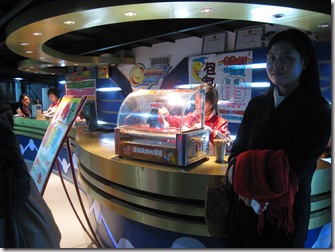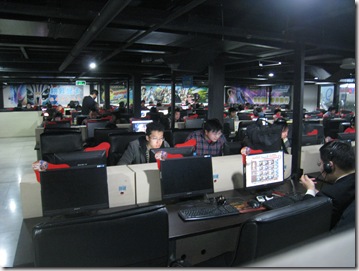iCafés in China
I spent the last week in China learning more about Internet Cafés (or iCafés) , which are becoming a key area of focus for the Unlimited Potential Group. This is part of our “shared access”strategy, where we are developing solutions for computers that are shared by a large number of people throughout the course of a day.
In emerging market countries, iCafés are a big deal. According to a recent report published by Euromonitor, 300 million people in emerging markets will be regularly using iCafés by 2010. That’s 5% of the world’s total population. In India and China, iCafés account for up to 40% of all Internet traffic.
And compared to the rest of the world, iCafés in China are huge, averaging over 100 PCs per facility. Some iCafés in Beijing can have as many as 350 PCs and are tricked out with fancy leather chairs and cordoned off “VIP zones” with large monitors and extra network bandwidth.
So I was pretty excited when I wandered into my first Chinese Internet café last Tuesday, located on the first floor of an office building right next to an electronics mall. It was a dark, low-ceilinged room with row after row of young men hunched over in front of flat panel monitors.
And what were they all doing there?
Playing World of Warcraft. Shooting at things. Winning at Mahjong. Some were watching movies. A few were surfing the web. But most were playing games. With great intensity. Many of the gamers were there with groups of friends and were playing together.
There is an interesting ecosystem that has built up over the last few years to support them. iCafé PCs in China have sophisticated game launcher software with up to 500 titles and are supported by a web service infrastructure that includes a Windows Update-like service to ensure that the games have the latest patches and bug fixes. Usage is closely monitored by the government, and your ID card is recorded before you can begin an iCafé session.
100 million people in China use iCafés on a regular basis. So this raises an interesting question for us: why on earth is the Unlimited Potential Group interested in this space, and how could any of our work here help us advance in our mission for enabling social and economic opportunity for people underserved by technology? Do we create a better gaming experience for the kids who hang out in Internet cafes? Build some better World of Warcraft add-on module tracking software?
In other words, by focusing on iCafés, are we really being true to our mission?
At first glance, the answer is obviously no. We are not going into the social and economic opportunity gaming business. But PCs are amazing tools that can be used for a lot more than just watching movies or gunning down imaginary dragons. They can be used for things like skills training and education. And that is where our strategy becomes interesting.
The government in China is really worried about unemployment right now. As my Microsoft colleague in China Nigel Burton likes to point out, the largest migration in the history of the world has occurred in China over the last 20 years, where 400 million people have moved from the countryside into cities (mostly in the eastern part of the country) to work primarily in manufacturing and construction. And as the global recession continues to prolong, more and more Chinese workers in manufacturing are losing their jobs.
So the government in China sees iCafés as a potential asset to help assist in the retraining of their workforce and are turning to companies like Microsoft for software and training programs to help with this effort. We have an iCafé eLearning pilot underway in one province in China right now, and are looking at ways to expand it to support more people.
But there are challenges we face in helping turn iCafés into a productive tool for society. Culturally, they are not viewed as friendly places where, for example, parents would want their daughters to go to learn how to use spreadsheets or other business software. We also need to create incentives for iCafé owners to support this training scenario. But our early experience from the pilot in China and from pilots in other parts of the world indicates that this idea of using iCafés as a workforce development tool has merit, and we are looking forward seeing how we can expand this idea more broadly.
Comments
- Anonymous
January 01, 2003
The comment has been removed

